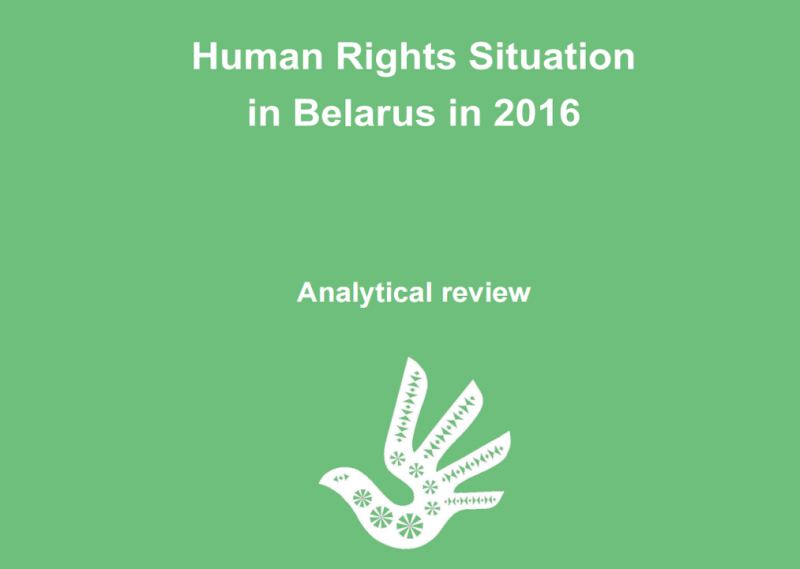Human Rights Situation in Belarus in 2016. Analytical Review
SUMMARY
- changes in the geopolitical situation in the neighboring countries continued to have a significant impact on both external and internal political situation in the country during 2016, which in turn affected the human rights situation in Belarus;
- the year saw a continuation of the policy of ‘soft practices’, which began in August 2015, as the authorities kept abstaining from violent dispersals of unauthorized protests, detention of protesters and sentencing them to short jail terms. At the same time, the year was marked by a nearly sevenfold boost in the number of cases when citizens were fined under administrative procedures for exercising freedom of peaceful assembly and expression, as compared to the previous year;
- we have to state that there were no systemic changes aimed at a qualitative improvement of the human rights situation in the country. Basic civil and political rights were still restricted at the legislative level. Despite an overall decrease in the scale of repression, the level of control over the society remained very high;
- the elections to the House of Representatives of the National Assembly of the 6th convocation were held on 11 September 2016; the vote did not lead to a significant increase in repression in the country and was held against a more favorable internal political background than in earlier campaigns. At the same time, the elections did not meet a number of key international standards for democratic and free elections, and the few, but widely announced changes to some decisions of the CEC were insufficient to qualitatively change the character of the campaign towards greater democracy and transparency;
- in 2016, the authorities were not able to fully give up the practice of politically motivated prosecutions. During the year, human rights defenders documented cases of prosecution on political grounds against seven persons: Vadzim Zharomski, Maksim Piakarski, Viachaslau Kasinerau, Dzmitry Paliyenka, Eduard Palchys, Aliaksandr Lapitski and Uladzimir Kondrus.
- at the same time, public reaction of the country’s civil society, advocacy campaigns and statements by human rights organizations about the political grounds of the above criminal cases helped release the defendants who were not subjected to sentences involving deprivation of liberty;
- places of detention continued to hold Mikhail Zhamchuzhny and Aliaksandr Lapitski, the prosecution of which was recognized by the human rights community as politically motivated harassment, while the prisoners themselves were recognized as political ones;
- Belarus continued to execute death convicts. During the year, four people were executed and four more were sentenced to death, two of which are still on death row;
- in 2016, human rights activists documented numerous instances of abuse committed by police officers. Monitoring of penal facilities helped expose a number of deaths of prisoners in institutions of the Ministry of Internal Affairs’ Department of Corrections. During the year, several persons complained about disproportionate use of force and cruel, degrading treatment. The majority of these cases, however, were not properly investigated by the supervisory authorities;
- in 2016, the government continued to practice forced labor. Numerous complaints sent by human rights activists to the prosecuting authorities and other public bodies were left without an appropriate response. In 2016, the authorities began to enforce Presidential Decree No. 3, which ordered certain categories of citizens to pay a special fee to reimburse state expenditures in the social sphere. In the case of non-payment of such a charge, these persons are subject to administrative responsibility, including administrative detention with compulsory labor;
- following the country’s passage of the second round of the Universal Periodic Review (UPR) at the United Nations Human Rights Council, the Belarusian Council of Ministers approved an inter-ministerial Plan of Action to implement the recommendations made within the UPR procedure. The country’s human rights community welcomed the move and emphasized their commitment to the common positions voiced in 2015-2016. Human rights defenders also called on the government to work closely with civil society organizations;
- despite repeated calls by the human rights community to create dialogue platforms for interaction with government agencies and to introduce the National Institute of the Ombudsman for Human Rights, there was no adequate and meaningful cooperation with the state during the year.


















